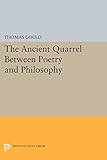The Ancient Quarrel Between Poetry and Philosophy / Thomas Gould.
Material type: TextSeries: Princeton Legacy Library ; 1172Publisher: Princeton, NJ : Princeton University Press, [2014]Copyright date: ©1990Edition: Course BookDescription: 1 online resource (348 p.)Content type:
TextSeries: Princeton Legacy Library ; 1172Publisher: Princeton, NJ : Princeton University Press, [2014]Copyright date: ©1990Edition: Course BookDescription: 1 online resource (348 p.)Content type: - 9780691600956
- 9781400861866
- 882.0109 20
- PA3131
- online - DeGruyter
- Issued also in print.
| Item type | Current library | Call number | URL | Status | Notes | Barcode | |
|---|---|---|---|---|---|---|---|
 eBook
eBook
|
Biblioteca "Angelicum" Pont. Univ. S.Tommaso d'Aquino Nuvola online | online - DeGruyter (Browse shelf(Opens below)) | Online access | Not for loan (Accesso limitato) | Accesso per gli utenti autorizzati / Access for authorized users | (dgr)9781400861866 |
Browsing Biblioteca "Angelicum" Pont. Univ. S.Tommaso d'Aquino shelves, Shelving location: Nuvola online Close shelf browser (Hides shelf browser)

|

|

|

|

|

|

|
||
| online - DeGruyter Playing with Signs : A Semiotic Interpretation of Classic Music / | online - DeGruyter The Form of Greek Romance / | online - DeGruyter Herodotus, Explorer of the Past : Three Essays / | online - DeGruyter The Ancient Quarrel Between Poetry and Philosophy / | online - DeGruyter Penelope's Renown : Meaning and Indeterminacy in the Odyssey / | online - DeGruyter The Origins of the Center for Hellenic Studies / | online - DeGruyter Fatal Years : Child Mortality in Late Nineteenth-Century America / |
Frontmatter -- CONTENTS -- ACKNOWLEDGMENTS -- INTRODUCTION -- PART I. THE ANCIENT QUARREL -- 1. "Philosophy" in Socratism -- 2. Socratism in Plato -- 3. Socratism in Aristotle -- 4. Plato's First Attack: Republic II -- 5. Pathos in Greek Religion -- 6. Plato's Second Attack: Republic X -- 7. Pathos in Greek Tragedy -- 9. Plato, Aristotle, and the "Shudder" -- 10. Pathos, pathos, passion, and Passion -- 11. The Quarrel Today -- 12. Two Case Histories -- 13. Plato/Aristotle and Freud/Jung -- PART II: PATHOS AND THE APPEAL OF TRAGEDY -- 14. Justice and Injustice in Homer -- 15. Justice and Injustice in the Oresteia -- 16. Aeschylus the Eleusinian -- 17. Pathos and the "Shudder" in Sophocles -- 18. The Anger of the Gods and Heroes -- 19. Sophocles or Socrates? -- 20. Euripides against the Myths -- 21. Our Euripides -- PART III: HAVING IT BOTH WAYS -- 22. Was Plato Serious? -- 23. The True Dionysus -- 24. The Trouble with Psychological Explanations -- 25. The Trouble with Aristotle's Alternative -- 26. The Nature of Tragedy -- BIBLIOGRAPHY -- INDEX
restricted access online access with authorization star
http://purl.org/coar/access_right/c_16ec
Affecting audiences with depictions of suffering and injustice is a key function of tragedy, and yet it has long been viewed by philosophers as a dubious enterprise. In this book Thomas Gould uses both historical and theoretical approaches to explore tragedy and its power to gratify readers and audiences. He takes as his starting point Plato's moral and psychological objections to tragedy, and the conflict he recognized between "poetry"--the exploitation of our yearning to see ourselves as victims--and "philosophy"--the insistence that all good people are happy. Plato's objections to tragedy are shown to be an essential feature of Socratic rationalism and to constitute a formidable challenge even today. Gould makes a case for the rightness and psychological necessity of violence and suffering in literature, art, and religion, but he distinguishes between depictions of violence that elicit sympathy only for the victims and those that cause us to sympathize entirely with the perpetrators. It is chiefly the former, Gould argues, that fuel our responses not only to true tragedy but also to religious myths and critical displays of political rage.Originally published in 1990.The Princeton Legacy Library uses the latest print-on-demand technology to again make available previously out-of-print books from the distinguished backlist of Princeton University Press. These editions preserve the original texts of these important books while presenting them in durable paperback and hardcover editions. The goal of the Princeton Legacy Library is to vastly increase access to the rich scholarly heritage found in the thousands of books published by Princeton University Press since its founding in 1905.
Issued also in print.
Mode of access: Internet via World Wide Web.
In English.
Description based on online resource; title from PDF title page (publisher's Web site, viewed 30. Aug 2021)


